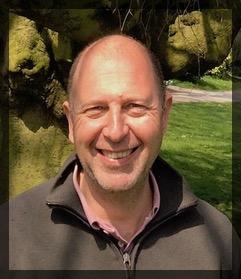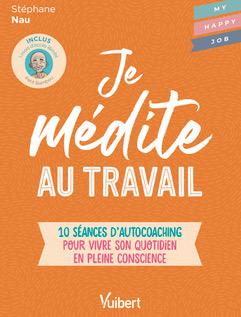How to fight burnout? Stéphane Nau, expert in mindfulness meditation and certified coach, urges us to meditate. Take a break to better refocus: what if the solution to suffering at work was through meditation? In the interview he gave us, he explains the benefits, including in the business world…
Article written by: ZIEL Jerome
In his book I meditate at work Published by Vuibert editions in the ‘My Happy Job’ collection directed by Fabienne Broucaret on March 15, Stéphane offers around fifty meditation exercises that are easy to implement, even in the office. To explain to us his interest in mindfulness meditation, Stéphane looks back on his professional career, entirely linked to his life journey. “I had the opportunity to exercise about fifteen professions, among others in the field of communication. I worked for a long time in an advertising agency. Then I created my own agency in Lille in the 2000s”. At some point, however, he realizes a lack of fit in his activity. Most of the time, Stéphane is content to simply relay the business strategy, with a view to making even more profits, to the detriment of humans.
The day Stéphane Nau crosses paths with meditation
In the 2000s, he met an acupuncturist, Saysonh Noraseng, who introduced him to meditation. While he usually lives a hundred miles an hour, he realizes the need to ask. Meditation even helps him find an answer to the depression who sends him to the hospital for six months. As he explains, “this depression was a real opportunity. Certainly, it caused abominable suffering. However, I also experienced tremendous moments of resilience. I thus had the opportunity to establish a very strong relationship with my own suffering. This period contributed enormously to structuring my new professional and personal path”.
Once recovered, he went to work with NGOs in Cambodia during three years. true to his entrepreneurial spirit, at the same time, he set up several companies linked to local development. “I thus co-created the first professional laundry network in Cambodia. I also participated in the creation of a company producing salads and other aromatic herbs for restaurants in Phnom Penh. Finally, my most important and dense experience was opening a luxury hotel in the middle of the Cambodian countryside, with a team of 15 Cambodians”.
Mindful meditation coach
Once back in France, he decided to radically change direction and share his meditation practice. “I told myself that I could share a form of wisdom and compassion towards oneself and towards others. After all, if it had saved me, it might also help other people.” He creates his own structure ‘How are you ?’ dedicated to spreading mindfulness. The goal is to appease people in the professional context. While developing benevolence in the teams.
To ensure the success of his project, he left to train in the United States. There, he follows the instructor training MBSR (Mindfulness-based stress reduction)a course created in 1979 by Jon Kabat Zinn, doctor in molecular biology and professor emeritus at the Faculty of Medicine of the University of Massachusetts (the famous MIT). As Stephane recalls: “Jon is an absolutely fascinating personality, practicing both yoga and mindfulness meditation. The program he has created makes reference to the world level. It is a rather long, demanding and intensive training”.
At the root of burnout: a stack of injunctions
Stéphane starts from the following observation: “Humans are not made to be ‘in the doing mode’ all the time. He needs to act in an adjusted way to recharge his batteries. However, in the business world, there is an impressive number of very strong injunctions linked to the system and to the individuals themselves. “Indeed, we are used to putting pressure on ourselves. However, the question is to find a way to recharge your batteries to carry out your projects. In the midst of a torrent of action to be taken, it is important to allow yourself to stop and see what is happening”.
As Stéphane observes, we are witnessing an upsurge in burn-outs, depressions and more generally suffering at work. When we work, we push our body and our mind to produce more and more actions. At all levels, we will produce without ever stopping for a moment to recharge our batteries. Or to simply think about whether what you are producing is right. Is it aligned, effective and in demand? “Most of the time, the effort provided is not adjusted to the demand”, Stephane notes.
In the business world, there is no question of stopping for a single moment. However, according to Stéphane, many people recognize the need to take breaks and take stock on its past, present and future actions. ” Gold, Stephane continues, the company and its infernal rhythms leave little room for cultivating mindfulness in the workplace. We have the feeling of being subject to time. Yet we are not here to be submissive, but to act autonomously. In other words, to live the time rather than running after it! It is a guarantee of performance and commitment”.
What is Mindfulness?
Mindfulness is about paying special attention to present time, without judgement, voluntarily taking a time out. “When we stop to look at what is happening in the present moment, we refocus on ourselves. Usually, we have the impression that what happens to us is because of the exterior… But, in reality, everything comes from within and depends solely on ourselves. We gradually forgot that we were the main actors in everything that happened to us”. Faced with the feeling of losing control, Stéphane invites us to stop and reclaim time for ourselves. “It’s not easy because it seems antinomic with the movement of the company. Indeed, we obey this injunction to spend all our time doing something.
Moreover, rather than making a value judgment on everything around us, why not consider things in their full objectivity? Without adding a qualifier. “We are constantly evaluating our experience. However, this feeds stress and malaise.
How to meditate when you are in business?
The employee can authorize himself to take real breaks five to fifteen minutes a day, regularly. “You have to keep in mind that we have many pockets of time available everywhere. If we don’t know it, it’s because we are prisoners of the ‘mode do'”. It is thus possible to focus on the full awareness of one’s own breath.
Management can also ritualize certain moments of breaks by encouraging new habits. At the beginning of meetings, for example: why not take five minutes, once everyone has arrived, to be silent before inviting each participant to express themselves on how they feel? “ This is a very powerful exercise of inclusion », Stephane says.
This opens the possibility of being able to say: ‘I feel upset’, ‘I feel anxious’ or even ‘I feel super happy’. Or on the contrary: ‘I feel a little in difficulty’. According to Stephane, “We then regain freedom of speech. I have implemented it in several companies: it works very well. efficiency of the meeting is affected. Even if, at first, it may seem difficult to reveal yourself a little bit. »
Ritualize meditation
According to Stéphane, it is also possible to take advantage of an available meeting room. People who feel the need could go there to get a little apart. Just sitting in a chair and being silent for a while, coming back to your own breath, can have incredibly beneficial effects!
Finally, let’s take the case of a person who would like to be a little more aware of what is going on before making a decision. If she’s feeling stressed, she can take a moment to stop, calm her body and mind before getting back into action. “There are so many ways to meditate. Dn my book ‘I meditate at work’, I thus propose a fifty exercises easy to implement, even in the office “.
Generally speaking, if we perceive tension, we may feel a sense of relaxation very strong in just three or four minutes of meditation, without having done anything at all. “That is what is extraordinary”, Stephane concludes.
We want to give thanks to the author of this post for this outstanding material
Mindfulness: I meditate at work with Stéphane Nau | O Magazine
Check out our social media profiles and also other pages related to themhttps://nimblespirit.com/related-pages/


